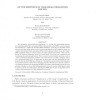Free Online Productivity Tools
i2Speak
i2Symbol
i2OCR
iTex2Img
iWeb2Print
iWeb2Shot
i2Type
iPdf2Split
iPdf2Merge
i2Bopomofo
i2Arabic
i2Style
i2Image
i2PDF
iLatex2Rtf
Sci2ools
IJFCS
2007
2007
On the Existence of Lookahead Delegators for NFA
We investigate deterministically simulating (i.e., solving the membership problem for) nondeterministic finite automata (NFA), relying solely on the NFA’s resources (states and transitions). Unlike the standard NFA simulation, involving an algorithm which stores at each step all the states reached nondeterministically while reading the input, we consider deterministic finite automata (DFA) with lookahead, which choose the “right” NFA transitions based on a fixed number of input symbols read ahead. This concept, known as lookahead delegation, arose in a formal study of web services composition and its subsequent practical applications. Here we answer several related questions, such as “when is lookahead delegation possible?” and “how hard is it to find a delegator with a given lookahead buffer size?”. In particular, we show that only finite languages have the property that all their NFA have delegators. This implies, among others, that delegation is a machine proper...
| Added | 15 Dec 2010 |
| Updated | 15 Dec 2010 |
| Type | Journal |
| Year | 2007 |
| Where | IJFCS |
| Authors | Bala Ravikumar, Nicolae Santean |
Comments (0)

